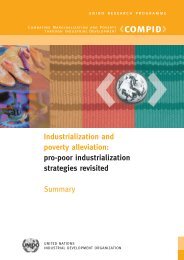Manual on the Development of Cleaner Production Policies ... - Unido
Manual on the Development of Cleaner Production Policies ... - Unido
Manual on the Development of Cleaner Production Policies ... - Unido
Create successful ePaper yourself
Turn your PDF publications into a flip-book with our unique Google optimized e-Paper software.
DEVELOPMENT OF CP POLICY<br />
MODULE 3: CP POLICY DEVELOPMENT CYCLE<br />
Planning is <strong>the</strong> stage when c<strong>on</strong>sultati<strong>on</strong> with stakeholders is crucial. Goals and schedules should be<br />
both realistic and implementable; before <strong>the</strong> acti<strong>on</strong> plan and programme are finally accepted for<br />
implementati<strong>on</strong>, stakeholders should give <strong>the</strong>ir views <strong>on</strong> <strong>the</strong>ir feasibility. It may be necessary to<br />
negotiate realistic targets with industries and plants and <strong>the</strong>n insist that <strong>the</strong>se targets be met.<br />
At this stage, it might be useful to focus <strong>on</strong> specific sectors, e.g. improving <strong>the</strong> envir<strong>on</strong>mental<br />
performance <strong>of</strong> particularly polluting enterprises/sectors, <strong>on</strong>ce more stressing <strong>the</strong> financial benefits to<br />
be gained from <strong>Cleaner</strong> Producti<strong>on</strong>. Efforts at this level can bring results quickly, even when <strong>the</strong><br />
policy framework is weak. It is advisable to design acti<strong>on</strong>s and mechanisms that will bring<br />
stakeholders toge<strong>the</strong>r and encourage voluntary participati<strong>on</strong> in various acti<strong>on</strong>s. This may result in<br />
enhanced general support for CP implementati<strong>on</strong> across different sectors.<br />
It is necessary to recognize <strong>the</strong> need for reas<strong>on</strong>able transiti<strong>on</strong> arrangements and to allow adequate time<br />
for compliance. Instruments should emphasize opportunities ra<strong>the</strong>r than obligati<strong>on</strong>s and it is useful to<br />
provide advice as well as enforce permits. At <strong>the</strong> same time, efforts should be made to streng<strong>the</strong>n<br />
envir<strong>on</strong>mental agencies so <strong>the</strong>y can develop <strong>the</strong>ir technical and m<strong>on</strong>itoring capabilities.<br />
Finally, <strong>the</strong> design <strong>of</strong> <strong>the</strong> acti<strong>on</strong> plan and programmes should take into account envir<strong>on</strong>mental<br />
effectiveness, ec<strong>on</strong>omic efficiency, ease <strong>of</strong> administrati<strong>on</strong> and <strong>the</strong> political acceptability <strong>of</strong> <strong>the</strong><br />
proposed measures (for fur<strong>the</strong>r details, see <strong>the</strong> secti<strong>on</strong> <strong>on</strong> <strong>the</strong> evaluati<strong>on</strong> <strong>of</strong> policy effectiveness later in<br />
this module).<br />
SLIDE: Organize human and financial resources<br />
• Beware <strong>of</strong> using lack <strong>of</strong> m<strong>on</strong>ey as an “idea killer”;<br />
• Put incentives in place;<br />
• Modify existing financial schemes to support CP;<br />
• Check foreign assistance programmes;<br />
• Assign existing pers<strong>on</strong>nel or use volunteers.<br />
<br />
A lack <strong>of</strong> resources can stifle any initiative, but lack <strong>of</strong> resources is also<br />
frequently used, or abused, as a justificati<strong>on</strong> for inacti<strong>on</strong>. With this slide, stress<br />
<strong>the</strong> possibility <strong>of</strong> using existing financial mechanisms—modified if needed—<br />
to support CP. Implementati<strong>on</strong> should be demand and efficiency driven, so that<br />
some <strong>of</strong> <strong>the</strong> costs are covered by beneficiaries.<br />
Background<br />
“We can’t afford it”, or “we have no people to do it with” are two <strong>of</strong> <strong>the</strong> most frequently used “idea<br />
killers”. Experience shows, however, that shortage <strong>of</strong> m<strong>on</strong>ey or manpower is not <strong>the</strong> reas<strong>on</strong> why a<br />
company does not implement cheap, low hanging fruit, CP opti<strong>on</strong>s that cost next to nothing and would<br />
actually bring savings. Even though a lack <strong>of</strong> m<strong>on</strong>ey and human resources may indeed be an obstacle<br />
to carrying out specific activities, it should not be used as an excuse for inacti<strong>on</strong>.<br />
CP policy implementati<strong>on</strong> does not have to be expensive and this can easily be c<strong>on</strong>firmed by a costbenefit<br />
analysis. When c<strong>on</strong>sidering how to finance CP implementati<strong>on</strong>, financial incentives are a<br />
useful starting point. CP implementati<strong>on</strong> should be a demand- and ec<strong>on</strong>omic efficiency-driven<br />
process. It is vital to get <strong>the</strong> external incentives for enterprises right and also to ensure that o<strong>the</strong>r<br />
policies do not create disincentives; mainstreaming CP is also important in <strong>the</strong> c<strong>on</strong>text <strong>of</strong> financing.<br />
Decisi<strong>on</strong>s <strong>on</strong> taxes, polluti<strong>on</strong> charges and financing schemes may be more significant than<br />
envir<strong>on</strong>mental regulati<strong>on</strong>s. Ministries <strong>of</strong> finance should think <strong>of</strong> taxes as a way <strong>of</strong> changing behaviour<br />
and not just generating revenues.<br />
PAGE 72
















